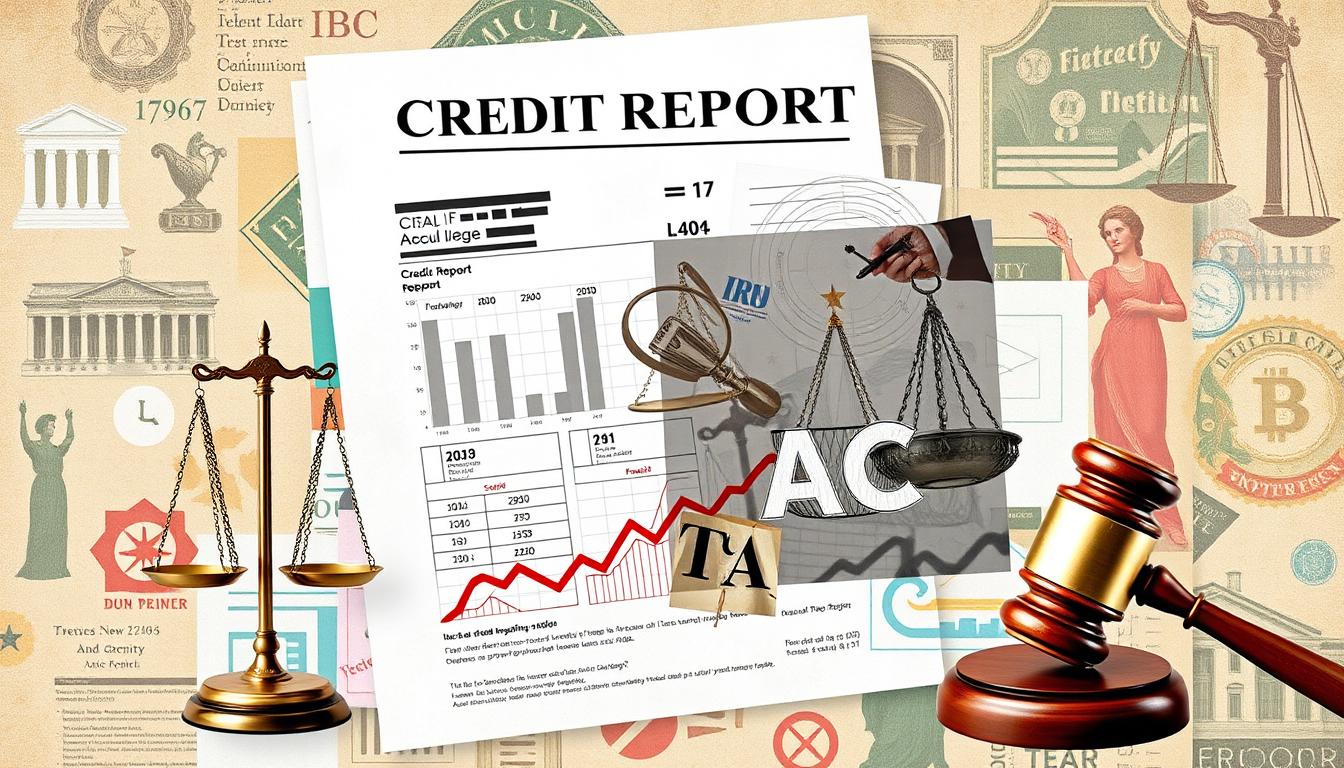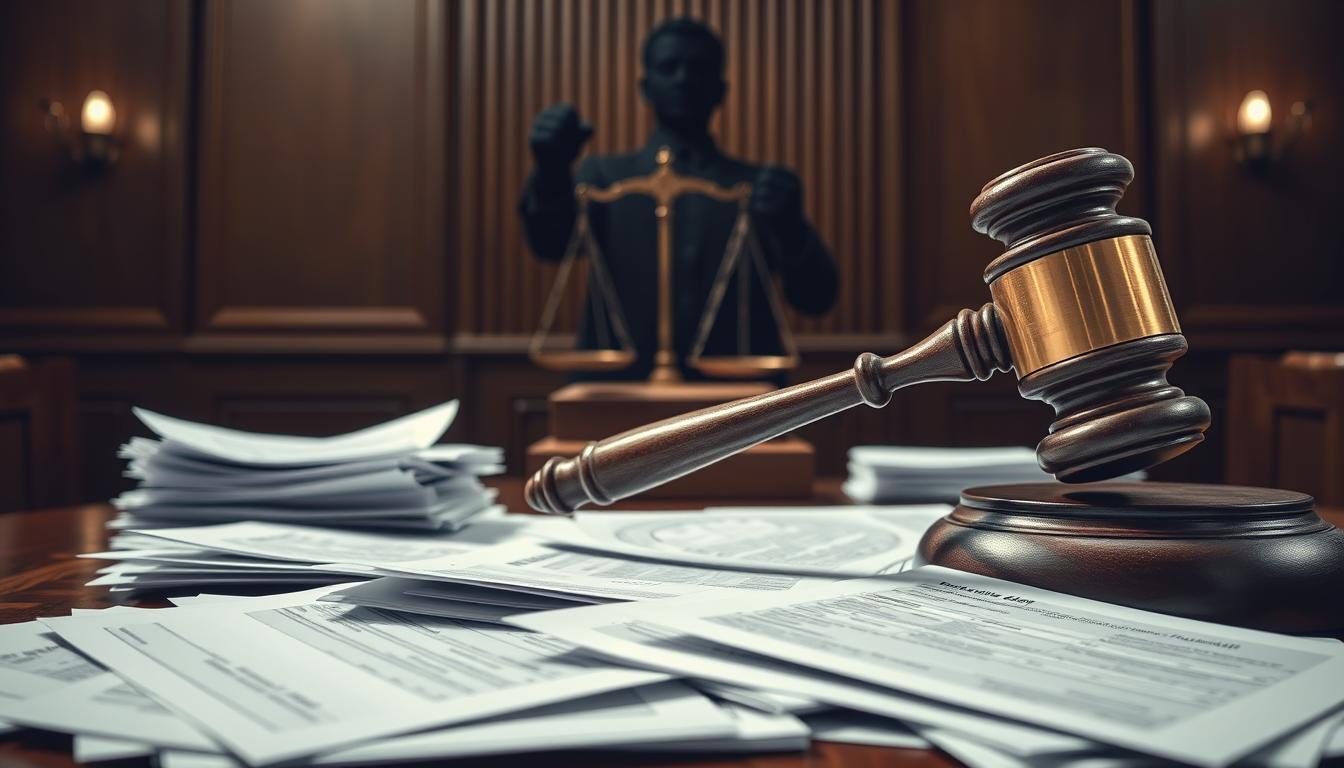Experian is a major credit reporting agency in the US. It manages consumer credit data. Sometimes, errors in credit reports can harm a person’s financial health. This leads many to ask if they can sue Experian.
We’ll explore legal options for dealing with Experian credit report errors. We’ll cover grounds for lawsuits, possible damages, and steps to take first. Knowing your rights helps protect your credit report’s accuracy.
Key Takeaways
- Consumers have legal options to dispute errors on their Experian credit reports.
- The Fair Credit Reporting Act (FCRA) provides consumer protections against inaccurate or incomplete credit reporting.
- Grounds for legal action against Experian may include negligence, willful noncompliance with the FCRA, and failure to investigate disputes.
- Potential damages and compensation from a successful lawsuit against Experian can include actual damages, statutory damages, and attorneys’ fees.
- Consumers should exhaust all administrative options before considering legal action, such as disputing errors directly with Experian.
Understanding Credit Reporting Agencies and Your Rights
Credit reports can be confusing, but knowing about credit reporting agencies like Experian is vital. These agencies collect and share consumer credit info. This data affects your ability to get loans, credit cards, and jobs.
The Role of Experian and Other Credit Bureaus
Experian, TransUnion, and Equifax are the main credit reporting agencies in the US. They gather info about your credit history. This includes payment habits, debts, and credit inquiries.
You can get free yearly credit reports from all three agencies. Checking your Experian credit report accuracy helps spot and fix errors. This ensures your financial records are correct.
Importance of Accurate Credit Reports
Correct credit reports are key for a healthy financial profile. Wrong info can hurt your Experian consumer rights. It may lead to bad lending choices or job denials.
Understanding Experian credit reporting agencies helps you protect your finances. Monitor your records and dispute any errors. This safeguards your financial well-being.
Disputing Errors with Experian
Fixing experian credit report errors can be tough. But there’s a way to dispute and solve these problems. Experian takes credit accuracy seriously and has a clear process for disputes.
First, identify the specific issue on your Experian credit report. This could be an inaccurate account or incorrect personal information. You can then start a dispute online, by mail, or phone.
- Gather supporting documentation: Collect evidence to back your claim, like payment records or identity documents.
- Submit your dispute: Use Experian’s online form, send a letter, or call their customer service.
- Monitor the investigation: Experian has 30 days to investigate and respond. They’ll contact creditors to verify information.
- Review the outcome: If Experian finds errors, they’ll update your report. If not, you can provide more evidence.
The experian credit report errors dispute process takes time. The outcome may not always favor you. But good documentation can help remove inaccurate information.

Accurate credit reports are vital for your finances. Addressing experian credit score disputes ensures your true creditworthiness shows. This protects your financial future.
Can You Sue Experian?
Yes, you can sue Experian under certain circumstances. This applies if you’ve had problems with your credit report. Legal action is possible against this major credit reporting agency.
Grounds for Legal Action Against Experian
You may sue Experian if they fail to investigate disputes. Another reason is if they knowingly report inaccurate information on your credit report. These actions could form the basis of a valid legal case.
Potential Damages and Compensation
- If you can prove Experian’s actions caused financial harm, you may get monetary damages. This could include denial of credit or job opportunities.
- You might also seek compensation for time spent resolving credit report issues. Emotional distress caused by the situation could be included too.
- In extreme cases, punitive damages may be awarded if Experian’s conduct is deemed very serious.
Your case’s success depends on your specific situation and evidence strength. It’s wise to consult an attorney who specializes in consumer credit disputes.
They can help you determine if your experian lawsuit or experian legal action is viable. Expert guidance can increase your chances of a favorable outcome.
“Consumers have powerful legal recourse against credit reporting agencies that fail to fulfill their obligations under the Fair Credit Reporting Act.”
The Fair Credit Reporting Act (FCRA)
The Fair Credit Reporting Act (FCRA) is a federal law overseeing credit reporting agencies like Experian. It promotes accuracy, fairness, and privacy of consumer credit information. The FCRA sets clear protections and rights for handling credit data.
Consumer Protections Under FCRA
The FCRA offers key protections for consumers dealing with credit reporting agencies such as Experian:
- The right to access your credit report and dispute any inaccuracies or errors
- Limitations on the types of information that can be included in your credit report
- Requirements for credit bureaus to investigate disputes and correct errors in a timely manner
- Restrictions on the use of your credit information for unauthorized purposes
- The ability to sue credit reporting agencies for violations of the FCRA
These safeguards ensure responsible handling of your credit information. They also provide recourse if issues arise.
Knowing your FCRA rights is vital when dealing with Experian or other credit bureaus. It empowers you to protect your credit information.

“The Fair Credit Reporting Act is one of the most important consumer protection laws in the United States. It gives consumers the power to ensure the accuracy and privacy of their credit information.”
Steps to Take Before Suing Experian
Found errors in your Experian credit report? Take action before considering a lawsuit. Experian must investigate disputes and fix verified errors by law. Following the dispute process can often solve issues without costly legal action.
Start by getting a copy of your Experian credit report. Look for mistakes like wrong account info, personal details, or fake accounts. These errors can harm your credit score.
Next, file a dispute with Experian online, by mail, or phone. Include proof like bank statements to support your claim. This helps Experian understand the issue.
- Obtain a copy of your Experian credit report. Carefully review the report for any errors or inaccuracies, such as incorrect account information, incorrect personal details, or fraudulent accounts.
- File a dispute with Experian. You can do this online, by mail, or by phone. Provide supporting documentation, such as bank statements or other records, to substantiate your claim.
- Monitor the progress of your dispute. Experian is required to investigate your claim within 30 days and provide you with the results in writing.
- If the dispute is not resolved to your satisfaction, consider seeking the assistance of a credit repair specialist or attorney. They can help you navigate the complex credit reporting process and ensure your rights are protected.
Track your dispute’s progress. Experian must investigate within 30 days and give you written results. This shows you’re trying to fix the problem.
If you’re unhappy with the outcome, seek help from a credit repair expert. They can guide you through the complex process and protect your rights.
Experian Lawsuits and Precedents
Legal battles involving experian lawsuit and experian legal action have set important precedents. These cases offer valuable insights into the credit reporting industry’s challenges. Consumers have sought accountability from Experian for inaccuracies and unfair practices.
Notable Cases and Outcomes
The Ramirez v. Experian Information Solutions, Inc. case was a significant landmark. Plaintiffs claimed Experian violated the Fair Credit Reporting Act (FCRA). The lawsuit resulted in a $24 million settlement.
Another key case was Saunders v. Experian Information Solutions, Inc.. It focused on Experian’s handling of identity theft disputes. The court found Experian failed to properly investigate and resolve these issues.
“These cases demonstrate that consumers have legal recourse when credit reporting agencies fall short in their obligations. They also serve as a reminder that Experian must prioritize accuracy and fairness in its practices.”
These successes offer hope for consumers seeking justice. However, legal action against Experian can face challenges due to the industry’s complexity. The company’s resources can make the path to justice difficult.
Despite obstacles, these precedents show the potential for change. Experian lawsuit and experian legal action can lead to meaningful compensation for affected individuals.

Hiring an Attorney for Experian Credit Disputes
Facing credit disputes or legal action against Experian? An experienced attorney can be your best ally. They understand the Fair Credit Reporting Act (FCRA) and can protect your rights.
Legal experts in credit disputes offer valuable assistance. They can negotiate with Experian and represent you in court if needed.
Attorneys also advise on the best strategies for resolving experian credit disputes. They help address experian credit report accuracy issues effectively.
- Negotiating with Experian – They can communicate on your behalf, ensuring Experian addresses your concerns and corrects any inaccuracies in your credit report in a timely manner.
- Representing You in Court – If necessary, your attorney can represent you in legal proceedings against Experian, leveraging their knowledge of FCRA regulations and precedents to protect your rights and potentially secure compensation.
- Advising on Legal Options – Lawyers can provide guidance on the merits of your case and the most effective strategies for resolving experian credit disputes or addressing experian credit report accuracy issues.
With an attorney, you’re more likely to succeed in correcting errors or disputing negative items. They can also help pursue legal action for FCRA violations.
Their expertise is crucial in navigating credit reporting and consumer protection laws. A skilled lawyer can make a significant difference in your case.
“Having a knowledgeable attorney on your side can make all the difference when dealing with a credit reporting agency like Experian.”
Alternative Dispute Resolution Options
Legal battles aren’t the only way to resolve credit disputes with Experian. Alternative dispute resolution (ADR) methods offer effective and often cheaper solutions. Mediation and arbitration are two popular ADR options.
Mediation: A Collaborative Approach
Mediation is a voluntary process with an impartial third-party mediator. The mediator helps Experian and the consumer negotiate a mutually agreeable resolution. This approach allows for more flexible and personalized outcomes than court rulings.
Arbitration: A Binding Decision
Arbitration is more formal, with a neutral arbitrator making a binding decision. It’s usually quicker and less expensive than litigation. However, consumers have limited options for appeal if the outcome is unfavorable.
When dealing with experian credit disputes, consider the pros and cons of these methods. Mediation encourages open communication and compromise. Arbitration provides a definitive resolution.

Explore all available options before pursuing formal legal action. Understanding alternatives helps consumers make informed decisions. Choose the method that best fits your needs and goals for resolving experian credit disputes.
Preventing Future Credit Report Errors
Keeping your experian credit report accurate is vital for your financial health. To avoid future errors, take proactive steps and stay alert. Here are some key actions to consider:
- Regular Credit Report Monitoring: Check your experian credit report often to spot any mistakes. Look it over at least once a year or more if you suspect issues.
- Prompt Dispute Resolution: If you find an error, act fast to dispute it. Follow the credit bureaus’ procedures to address your concerns quickly.
- Utilize Credit Repair Services: For complex errors, seek help from experian credit repair experts. They can guide you through disputes and ensure report accuracy.
By watching your experian credit report closely, you can reduce the risk of future errors. This helps maintain a healthy financial profile.
Managing your credit report is an ongoing task. But the rewards are worth it. Accurate information can lead to better financial chances.
Conclusion
Legal options for consumers regarding Experian are crucial in credit reporting and disputes. The Fair Credit Reporting Act (FCRA) protects individuals’ rights. Understanding these can help ensure accurate credit reports and guide legal action if needed.
You can sue Experian for failing to investigate inaccuracies or violating FCRA. This article outlined potential grounds for legal action and possible compensation. These insights provide a roadmap for safeguarding your financial well-being.
Stay alert and act quickly when issues arise with your Experian credit report. Familiarize yourself with available resources and legal remedies. This knowledge helps navigate the complex credit reporting system effectively.
Your financial future depends on understanding your rights and options. Knowing when you can sue Experian is a powerful tool for protecting your interests.
FAQ
Can I sue Experian for credit report errors?
What are the grounds for taking legal action against Experian?
What kind of damages can I recover in a lawsuit against Experian?
FAQ
Can I sue Experian for credit report errors?
Yes, you can sue Experian for failing to fix errors on your credit report. The Fair Credit Reporting Act (FCRA) allows consumers to take legal action against credit reporting agencies. This applies when agencies don’t meet their obligations.
What are the grounds for taking legal action against Experian?
You can sue Experian for not investigating credit report disputes properly. Other reasons include reporting inaccurate information willfully or maintaining incomplete credit data negligently. These actions violate the FCRA and can be grounds for a lawsuit.
What kind of damages can I recover in a lawsuit against Experian?
You may recover actual damages like lost job opportunities or higher interest rates. Statutory damages of up to
FAQ
Can I sue Experian for credit report errors?
Yes, you can sue Experian for failing to fix errors on your credit report. The Fair Credit Reporting Act (FCRA) allows consumers to take legal action against credit reporting agencies. This applies when agencies don’t meet their obligations.
What are the grounds for taking legal action against Experian?
You can sue Experian for not investigating credit report disputes properly. Other reasons include reporting inaccurate information willfully or maintaining incomplete credit data negligently. These actions violate the FCRA and can be grounds for a lawsuit.
What kind of damages can I recover in a lawsuit against Experian?
You may recover actual damages like lost job opportunities or higher interest rates. Statutory damages of up to $1,000 per FCRA violation are possible. In cases of willful or malicious actions, you might get punitive damages.
If successful, you could also recover your attorney’s fees.
What steps should I take before considering a lawsuit against Experian?
First, go through the credit dispute process with Experian. File a formal dispute and provide supporting documentation. Allow Experian time to investigate and respond.
Getting help from a credit repair specialist or attorney can be useful before suing.
Are there any alternatives to suing Experian?
Yes, you can try mediation or arbitration to resolve credit report issues with Experian. These methods can be faster and cheaper than going to court.
How can I prevent future credit report errors with Experian?
Regularly check your Experian credit report and dispute errors quickly. Consider using credit repair services if needed. Being proactive helps ensure accurate credit information.
This approach can reduce the risk of having to take legal action in the future.
,000 per FCRA violation are possible. In cases of willful or malicious actions, you might get punitive damages.
If successful, you could also recover your attorney’s fees.
What steps should I take before considering a lawsuit against Experian?
First, go through the credit dispute process with Experian. File a formal dispute and provide supporting documentation. Allow Experian time to investigate and respond.
Getting help from a credit repair specialist or attorney can be useful before suing.
Are there any alternatives to suing Experian?
Yes, you can try mediation or arbitration to resolve credit report issues with Experian. These methods can be faster and cheaper than going to court.
How can I prevent future credit report errors with Experian?
Regularly check your Experian credit report and dispute errors quickly. Consider using credit repair services if needed. Being proactive helps ensure accurate credit information.
This approach can reduce the risk of having to take legal action in the future.

